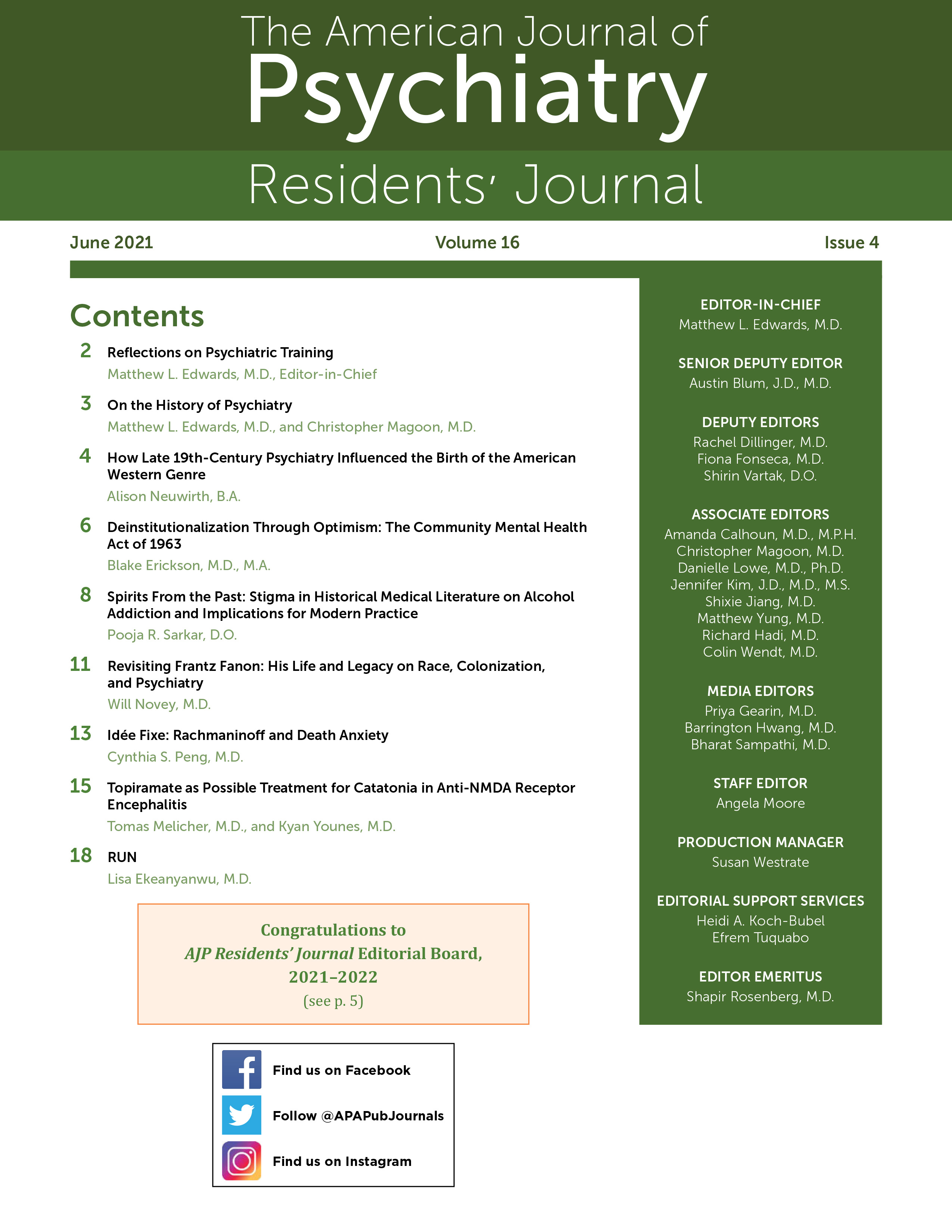Reflections on Psychiatric Training
One morning during medical school, I eagerly approached my senior resident during rounds on the medicine wards. Dressed in a short white coat, clipboard in hand, and with lapels flanked by a penlight on the left side and Snellen card on the right, I began to describe a patient with chronic pain who believed that the medical equipment used to manage her pain was sending signals. Even as our adjustments to her regimen yielded some improvement in her presenting condition, I could not stop contemplating the impact of the patient's mental disorder on her pain.
Now, closing my final year of general psychiatry training, embarking on specialty training in forensic psychiatry, and marking the end of my tenure as Editor-in-Chief of the Residents' Journal (RJ), I am still committed to better understanding the extent to which mental health affects our lived experiences. Charged with curating a journal of perspectives ranging from arts and culture to psychopharmacology, from medical history to interventional psychiatry, and from medical ethics to psychotherapy, I have relied on this curiosity to help shape a journal with perspectives as diverse as the people who contribute to and support it.
As I reflect on the past 3 years of professional training, I recognize the steady pulse that the RJ has provided in the background of my own professional life. The RJ's authors are reflective, patient-centered trainees, continually exploring how our field can better treat people with mental suffering. Our editors are respectful and engaging thought leaders in their fields, sharpening the articles and podcasts published each quarter while elevating the authors' voices throughout our pages.
We continue to benefit from the RJ's growth over the years. The journal now boasts a growing geographic reach, aided in part by a widening social media footprint. Its timely articles and podcasts, produced by psychiatrists-in-training around the country, are carefully shaped and molded by a thoughtful editorial board. I thank our media editors, Drs. Barrington Hwang, Priya Gearin, and Bharat Sampathi, for managing and showcasing the breadth and depth of our media initiatives. Our social media and podcasts are as vital to the RJ and its readership as are our published articles.
Although the members of the editorial board come from varied backgrounds, stages of training, and perspectives, we are united by a desire to cultivate this resident-led, academic journal dedicated to elevating the voices of trainees and future leaders in psychiatry. I am especially grateful to the following deputy and associate editors who have contributed to the RJ: Drs. Rachel Dillinger, Fiona Fonseca, Shirin Vartak, Danielle Lowe, Matthew Yung, Colin Wendt, Christopher Magoon, Amanda Calhoun, Jennifer Kim, Shixie Jiang, and Richard Hadi. They were supported by dedicated ad hoc reviewers Drs. Brent Schnipke, Julian Raffoul, and Amanda Mihalik-Wenger. Even amidst a deadly global pandemic that claimed the lives of millions around the world, redeployed trainees to the far reaches of medical services, and separated many from friends and family, these physicians-in-training continued to support our mission to foster a space for learners to share their ideas and perspectives, triumphs and failures, and hopes for the future of psychiatry.
I am proud to announce that my colleague Dr. Austin Blum is the RJ's new Editor-in-Chief. A skilled writer, lawyer, and future forensic psychiatrist, Dr. Blum will continue the tradition of compassion, humility, and service to the RJ—values that my predecessors, Drs. Shapir Rosenberg and Oliver Glass, instilled in me.



